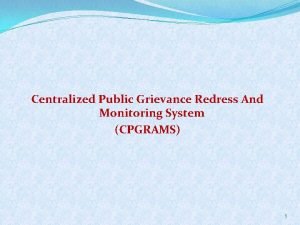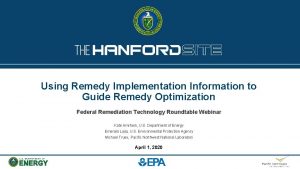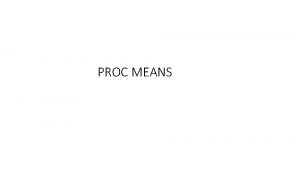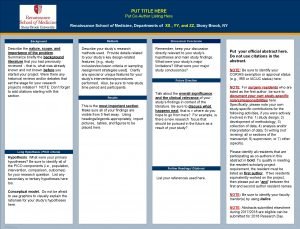Systems of Redress Redress means to remedy put












- Slides: 12

Systems of Redress • Redress means to remedy (put right) a situation which is unfair. • You need to know how these systems of redress can safeguard and promote people’s rights.

Organisational Polices • A policy is a written document which provides guidance to staff on how to promote the rights of staff and service users. • These policies are supported by codes of practice and charters. • They let people know the quality of care to expect. • They let people (staff and service users) know who to complain to, and how to complain, if they feel that their rights have been infringed. This is seeking redress.

Organisational Policies • • Examples: Admissions policy Health and safety policy Equal opportunities policy • See website for example policies: http: //www. hcchealth 1. com/rights-andresponsibilities. html

Local Complaints Procedures • Every health, social care or early years service must have a complaints procedure in place so service users can seek redress if they are not happy with the service they have received. • Their complaint will be investigated and they will receive a full and prompt reply. • The complaints procedure will explain what they should do. • Firstly they should complain to the service they are unhappy with or they can complain to the Clinical Commissioning Group (CCG. ) This is called local resolution. • https: //www. nhscc. org/ccgs/ • http: //www. buryccg. nhs. uk/

Health Service Ombudsman • The Ombudsman is independent of government departments and the NHS. • They will do an independent investigation into the complaint.

Industrial Tribunals • These are sometimes known as employment tribunals. • They are informal courts. They deal with cases of discrimination of employees or potential employees. • They are used by people who have experienced discrimination at work because of race, gender, age, disability, religion or sexual orientation.

Regulatory Bodies • Most organisations which provide a service are required, by law, to be registered with a regulatory body. • This also applies to individual professionals such as social workers, doctors, nurses and teachers. • This is so that standards and practices are kept. • Complaints can be made about the conduct of individual staff. • If they are found guilty of misconduct by their Regulatory Body they can be struck off the professional register and cannot work in that role again.

Commissions • The Equality and Human Rights Commission. • This commission brings together the work of the Equal Opportunities Commission, the Commission for Racial Equality and the Disability Rights Commission and also helps other groups such as those experiencing discrimination due to their age or sexual orientation. • It ensures that people are aware of their rights and how to use them.

• It offers advice and information. • It can help people who feel discriminated against to work out what their rights are and can advise them on what to do next. • It works with service providers, employers and organisations to help them develop good practice. • It makes sure that public authorities carry out their legal duties to tackle discrimination and promote equality. • It works with the government and with lawyers to make sure that social policy and laws promote equality.

• It uses its powers to enforce the anti discriminatory laws that we already have. • These laws exist to protect people from discrimination and unequal treatment and they promote their rights in relation to; • Age • Disability • Gender (including realignment) • Race • Religion and belief • Sexual orientation

European Court of Human Rights • This is an international court which was set up to interpret and apply the Human Rights Act. • It is based in the French city of Strasbourg. It considers cases of the countries bound by the convention, which is most of Europe. • Individuals cannot go directly to the EC of HR. • They must go through all legal opportunities open in their own country first.

• The claimants must show that they have been a direct victim of an alleged violation and that their Human Rights have been infringed. • For example: • The right to life • The right to freedom of expression • The right to liberty and security of person • The right to marry and have children • The right to education
 Fix it first remedy
Fix it first remedy Remedy upgrade
Remedy upgrade Bmc remedy performance
Bmc remedy performance What news does bottom bring his companions?
What news does bottom bring his companions? Gentry repertory ppt
Gentry repertory ppt Remedy user group
Remedy user group Cimex lectularius homeopathic remedy
Cimex lectularius homeopathic remedy Flexera remedy integration
Flexera remedy integration Tulalip remedy menu
Tulalip remedy menu The canterbury tales prologue characters
The canterbury tales prologue characters Put out the light and then
Put out the light and then You put your right foot in you put your right foot out
You put your right foot in you put your right foot out Cpgrams
Cpgrams






















